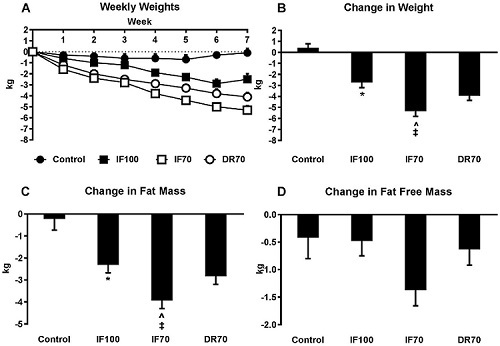
Intermittent fasting (IF) is popular diet seeing a lot of press these days and probably making an appearance in your social media feed. IF boast claims of weight loss, improved cholesterol, protection against disease, and even claims to sharpen memory. Here at M2 Performance Nutrition, we value personal experiences, but we also want to see what scientific studies tell us. So, we did some research to see whether the IF claims are truly supported by data, and if there are good reasons to give it a shot. Finally, we give you a breakdown of our suggested decision making approach about whether YOU are a good fit to try IF.
WHAT IS Intermittent Fasting?
First, what is intermittent fasting? It is an “intervalled” eating scheduled to include a specific number of hours or days of fasting. While fasting, no food is to be consumed (obviously); however, there is some disagreement from people about whether non-calorie beverages (such as coffee) are accepted. The three main schedules of IF are 16/8, 5:2, and 24 hr fasts.
- 16/8 is often deemed the easiest fast because it is primarily overnight plus breakfast. If you do not eat until noon and finish dinner before 8pm, you have completed a 16/8 fast.
- 5:2 refers to days, meaning five days of regular eating and two days of fasting during the week. Some people do the 2 days back to back, others break them up through the week.
- 24-hour fasts are just that, typically from dinner one day until dinner the next day. These can be incorporated once a week, once a month... etc.
The “Biology” of Intermittent Fasting
Next, let’s talk about the biology behind WHY intermittent fasting can, in theory, make us healthier. Many of the benefits that intermittent fasting boasts in regard to aging, memory, and protection from diseases come from the science behind a biological process called AUTOPHAGY.
So, what is Autophagy??
Autophagy literally means “self-eating.” In other words, autophagy is essentially the body’s recycling process. It takes deformed, unhealthy proteins and uses them to create new "healthier" ones.
Evolutionarily, it makes sense to use this pathway when our bodies are in calorie deficit. Basically, “recycle” the trash and turn it into new energy.
Autophagy has been shown to be involved in pretty much every system in the body, but most of the research has focused on the immune system and the neurological system.
Types of Autophagy
There are two types of autophagy: macroautophagy, which is initiated through nutrient deprivation and mitophagy, which occurs even in nutrient rich states.
- The body naturally begins mitophagy when it finds excessive or damaged cells that need to be repurposed. This is happening all the time in our bodies
- Macroautophagy is more of an induced process. For example BOTH fasting and exercise cause the body to begin macroautophagy
Interestingly, exercise has been shown to potently induce autophagy in multiple studies 1,2,3. A natural resulting question is whether dietary fasting can further provide health benefits through autophagy on top of exercise. In other words, are exercise and fasting synergistic for autophagy, or is there a limit to how much we of this key process we can induce?
Studies attempting to answer this question are just being published, but some studies are beginning to shed light on the question.
While we don't know if fasting is beneficial for those that are already exercising, there is an incredible amount of research on fasting in animals, most reporting to health benefits.
Animal Model Data
Here’s a summary of some of what has been found in MOUSE studies:
- Mice who were fed every other day out performed mice who were fed regularly in regards to treadmill training 4
- After 11 months, mice who were fed every other day had better memory and exercise tolerance than the control or high fat groups 5
- Mice who fasted longer between meals were shown to live longer than mice that were free fed and had delayed disease development 6
- Effects on mouse immunity were mixed, with some very negative effects 7,8 and some positive ones 9,10
- Fasting improved the composition and diversity of the gut bacteria in mice 11
As a take home point, animal models have shown that intermittent fasting has CLEAR benefits for overall health and longevity. This is not really controversial based on the sheer number of publications and consistency of results.
Human Studies on Intermittent Fasting
Sadly, only a few well-run studies exploring IF have been examined in humans and nearly all of them are focused on weight loss, analyzing overweight and obese subjects. The trials are mainly small sample sizes, short time frames, and include calorie restriction. With not many studies done on IF in large groups of healthy people over long spans of time, it’s hard to correlate any claims from current studies to practical usage. To be fair, examining the effect of IF on longevity would be a rather LONG experiment to run in humans.
Intermittent Fasting | Study #1
A study done by the University of Illinois in 2013 looked at 30 individuals ranging from normal to overweight for the course of 12 weeks. 12
Take Home Point:
Not eating for a large part of the day is a good way to reduce calorie intake.
Study Details
15 participants were required to fast every other day and eat only 25% of their daily calories on fasting days. Participants were given their meal for fasting days to ensure the caloric and macro breakdown fit the test criteria, but were at home on non-fasting days eating at will and keeping a food log.
(FYI, people generally suck at remembering what they ate, but people use this approach to drive down the costs. Providing all the meals for participants in a study gets $$$$.)
The study noted that overweight individuals are likely to under-report food intake by roughly 30%. It did not access physical activity or nutritional breakdown of what the fasting group chose to eat on their days at home.
Of the 15 participants in the fasting group, two reported headaches and one reported digestive issues. Other than weight-loss, the study monitored HDL, LDL, blood pressure, homocysteine (an amino acid in the blood - high levels show a risk for heart disease), C-reactive protein (produced by the liver to combat inflammation), adiponectin (regulates blood glucose and helps break down fatty acids), leptin (the hormone that makes us feel full), and restinin (which may be linked to type two diabetes).
The study found no significant difference between the two groups other than weight loss, which should be expected when the fasting group had a MASSIVE caloric deficit every other day and the control group was at home eating at will.
Intermittent Fasting | Study #2
Both a 2013 and a 2016 study followed people adhering to Ramadan, an Islamic religious fast in which abiders do not eat while the sun is out for one month. 13, 14
Take Home Point:
Both studies contain a very small sample size and not enough controls were put into place to ensure that equal amounts of calories were consumed as prior to Ramadan. From personal coaching experience, most people following Ramadan actually GAIN weight due to the incredible number of food-focused parties thrown at night throughout the month.
Study Details:
The study monitored their power output, hematocrit, hemoglobin, plasma sodium and potassium. The first study analyzed sprints once in the morning and once in the afternoon. They found that the power output of the athletes declined over the course of the five weeks and that they were noticeably more fatigued during the afternoon sessions.
The second study analyzed cognitive function and decision making and found that both were impaired while fasting. As Ramadan allows fasters to eat throughout the evening hours, this makes total sense that they would have more energy for their morning workout.
Intermittent Fasting | Study #3
A more recent study looked at participants over a year and compared the results of intermittent fasting vs typical caloric restriction on weight loss and cardiovascular risk factors. This is one of the stronger studies because of the length of time. 15
Take Home Point:
IF did not produce greater weight loss or blood chemistry than traditional dieting approaches.
Study Details:
The put each group into a roughly 25% deficit, with the IF participants fasting two non-consecutive days each week. For six months they monitored their progress and for 6 months monitored their results through a maintenance phase. There were no significant differences between groups in regards to weight loss or health markers. The only discernible difference was the reported hunger levels of the fasting group being greater to that of the other group who was also restricted calorically but eating every day.
Intermittent Fasting | Study #4
A 2015 study out of Chicago looked at (otherwise healthy) obese adults and the difference in weight loss was performed. 16
Take Home Point:
IF did not produce greater weight loss or blood chemistry than traditional dieting approaches.
Study Details:
Blood pressure, heart rate, triglycerides, fasting glucose, fasting insulin, insulin resistance, C-reactive protein, or homocysteine concentrations were measured for three groups: an intermittent fasting group, a calorie restricted group, and a control group. Just as the other study, this trial concluded that alternate-day fasting did not produce more weight loss, weight maintenance, or cardio protection compared to daily calorie restriction. The dropout rate was however 9% higher for the fasting group vs the calorie restriction group.
Intermittent Fasting | Study #5
Finally, a study looked at overweight middle-aged women for eight weeks. They were split amongst four groups: intermittent fasting at 70% of maintenance calories, intermittent fasting at true maintenance, dietary restriction at 70% of maintenance calories, and control. The intermittent fasters had three non-consecutive fasting days per week and the dietary restricted group ate every day at the same caloric deficit. 17
Take Home Point:
Calorie restriction using both IF and traditional dieting led to weight loss. Intermittent fasting in the “control” group also lost weight because the participants unintentionally ate ~250 less calories per day.
Study Details:
They found no lasting insulin differences between groups and the IF 70% group was the only group to see changes in any health markers like cholesterol. The fasting group at maintenance calories actually saw a temporary increase in risk markers for type two diabetes. The most interesting find of this study was, however, that both intermittent fasting groups reported under eating by nearly 250 calories on fasting days!!! This might actually be a strong point for IF should it makes it mentally easier to restrict calories versus traditional dieting. Interestingly, the deficit IF group was noted to have lost LEAN MASS, NOT JUST FAT. This could be due to minimal protein in the provided meals or from the fasting itself. The graph below demonstrates the changes in weight, fat mass, and lean mass among the four groups examined.

Changes in anthropometric outcomes following 8 weeks of intermittent or continuous intake at 70% and 100% of daily energy requirements. (A) Weekly weights; (B) change in body weight; (C) change in fat mass; (D) change in fat‐free mass.
Summary of the IF Science
Is intermittent fasting a tool one could use to lose weight? ABSOLUTELY. Anytime the window of eating is shortened it becomes easier to eat less calories. The take home point is that, over time, it does not magically produce better weight loss than traditional dieting strategies that don't use fasting.
If you regularly wake up to eat breakfast at 6am and are instead now waiting until noon, you are skipping straight to lunch. Could you eat just as many calories for lunch as if you were to have had breakfast and lunch that day? Totally.
If you train in the morning or are grumpy when hungry then 16/8 fasting (or purposefully fasting in general) is probably not ideal for you.
Instead of debating whether or not IF is a good way to lose weight (it is), I think it's smarter to explore whether IF provides additional health benefits.
For me, the first question is do you NEED to fast to induce autophagy? The answer is clearly NO. Exercise does a damn good job at making this happen both in the body and in the brain. Additionally, autophagy occurs during the normal 8 hour sleeping window as well. So, to be clear, if you exercise and sleep appropriately, you are already inducing autophagy.
The next question is could fasting on top of exercise produce even better effects? The answer is, stay tuned...
The next 10 years are going to produce a huge volume of HUMAN research on IF, and we will begin to learn just how powerful this dietary approach is for things beyond just weight loss.
The animal model data indicates the potential is enormous, but remember that science is filled with observations in animal models that never panned out in humans. Mice have dramatically faster metabolisms than we do, so a 24 hour fast in a mouse equates to a significantly longer period in you and I.
My personal GUESS is that fasting will provide a health benefit in humans, but what duration of fast is required to make that happen is anyone's guess. For this reason, studies on IF will need to examine different durations of fasting to determine how long one must go without eating to optimize their health.
One important control for ALL these studies is to make sure that we're simply not examining the effects of caloric restriction. To be very clear, calorie restriction induces MANY health benefits, regardless of whether or not it is achieved through fasting or not.
Intermittent Fasting Recommendations
In real word practical experience, the people that seem to do best with intermittent fasting protocols all have a few similar things going for them:
- Low stress
- Adequate macro and micronutrient intake
- Training volume that is not extremely high
- Sleep 8+ hours a night
If that’s you and you want to give IF a shot, then by all means go for it. If you don’t fit all those descriptors, then you’re better off placing your energy into fixing that aspect of your life before unintentionally generating even more stress through fasting (and to be clear, fasting is a stress response).
If you have any questions or want to debate the topic using SCIENCE, please feel free to reach out to us directly! We will never run from a good, healthy debate.
Alright, so you've decided to give IF a try. Where do you start?
1) Start small. Try a 10 hour eating window first, then move to 8.
2) Make your first fasting experience occur on a full rest day.
3) Don't try fasting for the first time after a bad night of sleep, or at a particularly stressful time in life.
4) Don't use IF as an excuse to eat garbage during the eating hours of your protocol. Keep a high quality diet.
Ready to Learn More With M2?
If you liked reading about the research and findings on this area of health and nutrition, then we invite you to check out the M2 Certification Series! This 5-course certification will give you a comprehensive look on total health for yourself and your clients. If you want to be on the list to get first access and early bird pricing, click below




